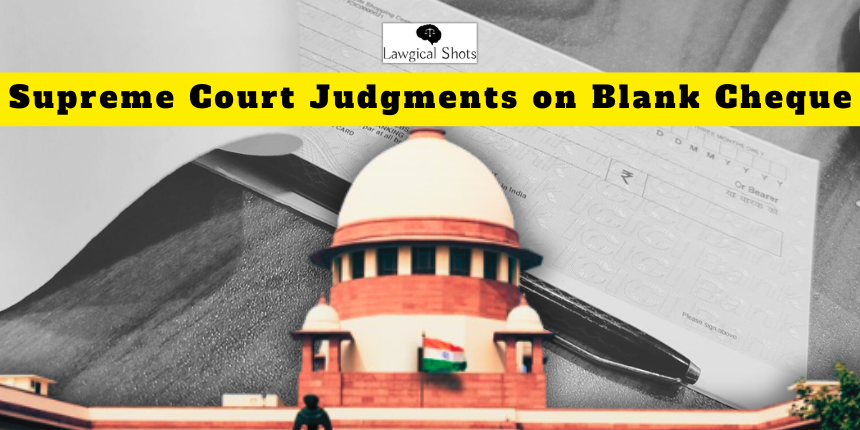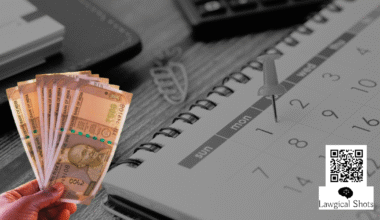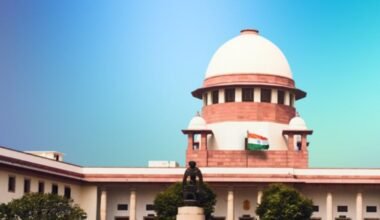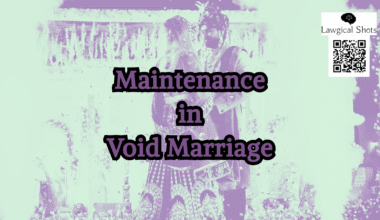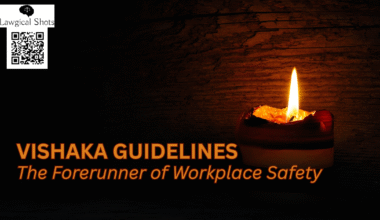A bounced cheque is a headache, for the one who owed money, as well as the one who was at the receiving end. This is all about a cheque drawn for paying a certain amount and duly signed. But what is the status of a blank cheque? What happens if someone hands over a blank cheque against a debt and the beneficiary has to take care of filling the amount and other details? Is it still valid for the purpose of Section 138 of Negotiable Instruments Act? Here, we have compiled the Supreme Court judgments on blank cheque subject to various aspects, including the engagement of handwriting experts, to the presumption of debt, and so on.
Landmark Supreme Court Judgments on Blank Cheque
C. Antony Vs. K.G. Raghavan Nair (2002)
In this case, the accused claimed misuse of blank cheque handed over to a third party who did not return the said blank cheque after payments were secured, and was not even examined by the complainant. The Court took note of the fact that the ink of signature and the rest of contents of the cheque did not match, further strengthening the version of accused regarding misuse of a blank cheque. Therefore, the Court allowed the appeal and set aside the High Court’s judgment which found the appellant guilty of cheque dishonour offence punishable under Section 138 of Negotiable Instruments Act, 1881.
Kalyani Bhasker v. M.S. Sampoornam (2007)
In this matter, the accused questioned the genuineness of signature and applied for sending the cheque in question for hand-writing expert opinion. The said request was rejected by the Magistrate and the refusal was upheld by the High Court. However, the Apex Court found the said approach erroneous as against the rights of the accused. The Court commented that “The appellant cannot be convicted without an opportunity being given to her to present her evidence and if it is denied to her, there is no fair trial. ‘Fair trial’ includes fair and proper opportunities allowed by law to prove her innocence. Adducing evidence in support of the defence is a valuable right. Denial of that right means denial of fair trial. It is essential that rules of procedure designed to ensure justice should be scrupulously followed, and courts should be jealous in seeing that there is no breach of them.”
Also explore about Cheque Bounce Process
T. Nagappa v. Y.R. Muralidhar (2008)
While pressing upon the accused person’s right to be heard when suggesting a misuse of blank cheque by the complainant, the Supreme Court held that “When a contention has been raised that the complainant has misused the cheque, even in a case where a presumption can be raised under Section 118(a ) or 139 of the said Act, an opportunity must be granted to the accused for adducing evidence in rebuttal thereof. As the law places the burden on the accused, he must be given an opportunity to discharge it. An accused has a right to fair trial. He has a right to defend himself as a part of his human as also fundamental right as enshrined under Article 21 of the Constitution of India. The right to defend oneself and for that purpose to adduce evidence is recognized by the Parliament in terms of sub-section (2) of Section 243 of the Code of Criminal Procedure”
Oriental Bank of Commerce v. Prabodh Kumar Tewari (2022)
In this case, a blank cheque signed and handed over in the name of security, and the question surrounded the engagement of a hand-writing expert for determining whether the rest of details were in the handwriting of the respondent. The Court thereby held that “A drawer who signs a cheque and hands it over to the payee, is presumed to be liable unless the drawer adduces evidence to rebut the presumption that the cheque has been issued towards payment of a debt or in discharge of a liability – The presumption arises u/s. 139 – The evidence of a hand-writing expert on whether the respondent had filled in the details in the cheque would be immaterial to determining the purpose for which the cheque was handed over – Therefore, no purpose is served by allowing the application for adducing the evidence of the hand-writing expert.”
Bir Singh v. Mukesh Kumar (2019)
This is a landmark Supreme Court judgment on blank cheque wherein the Court settled an important factual aspect in cheque bounce cases. The Court illuminated that “If a signed blank cheque is voluntarily presented to a payee, towards some payment, the payee may fill up the amount and other particulars. This in itself would not invalidate the cheque. The onus would still be on the accused to prove that the cheque was not in discharge of a debt or liability by adducing evidence……Even a blank cheque leaf, voluntarily signed and handed over by the accused, which is towards some payment, would attract presumption under Section 139 of the Negotiable Instruments Act, in the absence of any cogent evidence to show that the cheque was not issued in discharge of a debt.”
Kalamani Tex and another v. P. Balasubramanian (2021)
In another case of misuse of blank cheque, wherein the signatures were admitted by one of the appellants on the cheque as well as an undertaking, the Apex Court exemplified that the Trial Court should have presumed that the cheque was issued as consideration for a legally enforceable debt. Considering the admitted business relationship between the parties, the Court refused to uphold the defense raised that only a blank cheque and signed blank stamp papers were given to assist respondent for some debt recovery proceedings. The Court expressed that “ the Statute mandates that once the signature(s) of an accused on the cheque/negotiable instrument are established, then these ‘reverse onus’ clauses become operative. In such a situation, the obligation shifts upon the accused to discharge the presumption imposed upon him.”
Rajesh Jain v. Ajay Singh (2023)
The case revolves around accused suggesting that the complainant misused a blank cheque leaf. The Court relied on its decision in Bir Singh v. Mukesh Kumar to clarify that “mere admission of the drawer’s signature, without admitting the execution of the entire contents in the cheque, is now sufficient to trigger the presumption.” Thus, where the signature of the accused person was undisputed, the complainant’s case stood satisfied for sustaining conviction under Section 138 of NI Act.
Rohitbhai Jivanlal Patel v. State of Gujarat (2019)
In this case, the Court pointed at the appellant’s inability to deny his signatures but attempt to suggest that his signatures were available on blank stamp paper with another. The Court raised concern that “This suggestion is too remote and too uncertain to be accepted. No cogent reason is available for the appellant signing a blank stamp paper. It is also indisputable that the cheques as mentioned therein with all the relevant particulars like cheque numbers, name of Bank and account number are of the same cheques which form the subject matter of these complaint cases. The said document bears the date 21.03.2007 and the cheques were post-dated, starting from 01.04.2008 and ending at 01.12.2008. There appears absolutely no reason to discard this writing from consideration”
Supreme Court on Blank Cheque – Conclusion
What can be seen so far is that the law pertaining to blank cheques is that they do not lose force just because the same was signed by the drawer and the complainant filled the details himself. The essence of validity of blank cheque still lies in parties proving the existence or absence of a legal debt. If the cheque was voluntarily signed, even if claimed to be misused, if the person cannot prove that there was no legal debt, the legal clutches remain and conviction may follow.
